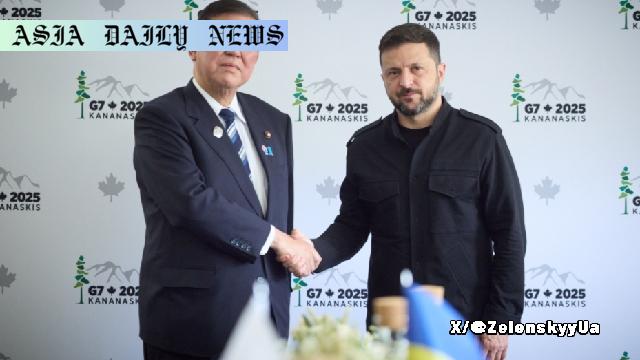Ukraine receives Japan’s continued support for a fair and lasting peace, pledged by PM Ishiba during the G7 summit talks.
Japan pledges over $12 billion in support to Ukraine.
PM Ishiba highlights the importance of fair and lasting peace.
An anti-personnel landmine handling conference is planned for October.
Japan and Ukraine strengthen collaboration to counter Russian aggression.

Japan’s Commitment to Supporting Ukraine
The Japanese Prime Minister Ishiba Shigeru recently made a significant commitment to Ukraine at the Group of Seven (G7) summit, pledging to continue Japan’s support for Ukraine’s struggle to achieve a fair and lasting peace. His discussions with Ukrainian President Volodymyr Zelenskyy were his first one-on-one meeting with the leader, and they underscored Japan’s dedication to playing an active role in global peacekeeping.
During the 30-minute meeting in Canada, the leaders agreed to strengthen their ties further, with Japan promising over $12 billion in aid aimed at helping Ukraine stabilize and rebuild. This financial contribution is one aspect of Japan’s multifaceted approach to assisting Ukraine amidst the ongoing complexities of the Russian invasion. As Ishiba emphasized, achieving peace in the region is both an immediate goal and a foundation for longer-term stability in Eastern Europe.
A Strong Focus on Reconstruction and Landmine Clearance
A notable feature of Japan’s support for Ukraine is its emphasis on reconstruction efforts and ensuring safety within the country. Ishiba announced plans to host an international conference on handling anti-personnel landmines, scheduled for October. This initiative aligns with broader, coordinated efforts from G7 partners. The devastation Ukraine has faced from Russian attacks extends beyond immediate physical damage, as the presence of unexploded landmines continues to pose a critical threat to civilian life and livelihoods. Japan’s proactive step to lead discussions on this matter underscores its commitment to supporting Ukraine’s recovery beyond monetary aid.
Reconstruction will also include rebuilding destroyed infrastructure, which Zelenskyy highlighted as having sustained substantial damage from recent Russian strikes. He expressed gratitude to Japan for its assistance, recognizing the significance of international solidarity in Ukraine’s efforts to counter aggression and rebuild its future.
Strengthened Partnerships Amid Global Stakes
The interaction between Ishiba and Zelenskyy illustrates the strengthening bonds between Japan and Ukraine. As a member of the G7, Japan’s stance is critical in fostering collective international action to address the challenges posed by Russia’s invasion of Ukraine. The leaders’ agreement to maintain close cooperation highlights Japan’s role as an influential voice on issues of international peace and collaboration.
Additionally, Japan’s actions reflect its adherence to values such as sovereignty and peace, which are principles deeply embedded in its post-World War II foreign policy. Ishiba’s assurances point to a more active Japanese role on the global stage, especially in dealing with security concerns that span continents.
The challenges remain monumental for Ukraine as it navigates the devastating impacts of the invasion. However, partnerships like the one forged between Japan and Ukraine provide hope for a resilient and united global effort aimed at lasting peace.
Commentary
Japan’s Support as a Beacon of Global Unity
The Japanese Prime Minister’s pledge of over $12 billion in support to Ukraine is more than just a political or diplomatic statement; it symbolizes the power of international unity in the face of aggression and adversity. Japan’s actions stand out as a testament to global cooperation and the role countries can play in fostering peace and stability, especially for nations grappling with crises beyond their control.
A Step Forward in Rebuilding Peace
In recent times, Ukraine has become the focal point of global conversations about security, sovereignty, and resilience. Japan’s commitment to aid Ukraine shines as an example of how nations, even those geographically distant, recognize the far-reaching ramifications of instability in a region. Prime Minister Ishiba’s promise, coupled with the upcoming conference on landmine clearance, underscores Japan’s understanding of peace being more than the absence of conflict—it is the ability to rebuild and lead a dignified life post-chaos.
Setting a Global Precedent
Japan’s active involvement also demonstrates that nations don’t have to rely solely on proximity or size to make a difference. A developed, technologically advanced nation like Japan can provide not just financial aid but also innovation and expertise in critical areas such as landmine removal and infrastructure development.
In conclusion, this partnership is not merely bilateral; it reflects a global wave of solidarity. It compels nations worldwide to introspect and act decisively, ensuring that justice and peace are upheld as universal tenets. Japan’s actions serve as a model for constructive international participation during one of the most challenging periods for Ukraine in recent history.


